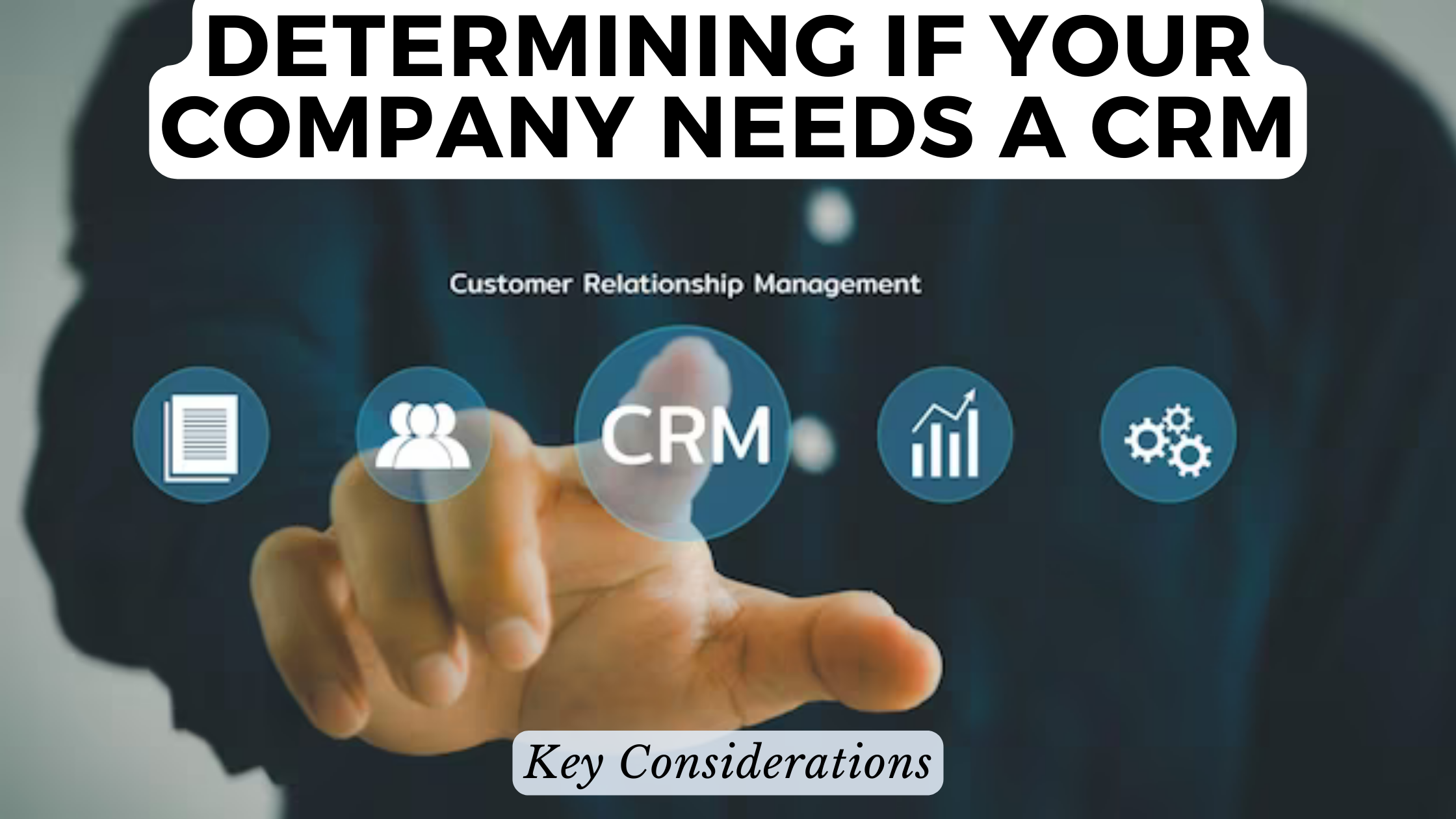Determining if Your Company Needs a CRM: Key Considerations
- Proposal Software Customer Relationship Management


Determining if Your Company Needs a CRM: Key Considerations
Customer relationship management (CRM) software has become an invaluable tool for businesses of all sizes. A good CRM centralizes customer data and interactions to provide a unified view of the customer. This allows companies to better track, nurture, and convert leads while providing high-quality customer service.
However, not every business necessarily needs a dedicated CRM platform. When determining if your company would benefit from CRM software, there are several key factors to consider:
1. Your business model
The type of business you operate often dictates the need for CRM. Companies that deal with large numbers of leads/customers on a regular basis tend to get the most value from CRM software. For example, B2B/B2C ecommerce stores, marketing agencies, real estate firms, and other sales-driven businesses rely heavily on CRMs.
On the other hand, companies with simpler operations or fewer touchpoints may not gain as much from a CRM. A local retail store or restaurant, for instance, may be able to get by with simpler contact management.
2. Volume of leads/customers
The overall volume of leads and customers your business handles is a major determinant of whether you need CRM software. If your sales team is fielding dozens of leads per day or your support staff is communicating with hundreds of customers per week, having a centralized CRM is almost a necessity.
However, if your volumes are lower, basic spreadsheets or contact forms may still work. Focus on how a CRM could help you scale and improve processes as leads/customers grow.
3. Need for sales/marketing automation
CRM platforms like HubSpot and Pipedrive provide robust features for automating repetitive sales and marketing tasks. This includes email sequencing, landing pages, form building, lead scoring, and more.
If your business needs to automate lead nurturing and sales processes, the workflow builders in CRM systems can save huge amounts of time and effort. For less complex processes, standalone marketing automation or forms tools may work.
4. Data tracking needs
CRM software provides holistic tracking of all customer interactions and sales data in one place. This gives sales and support teams detailed visibility into lead/customer histories, communications, deals in progress, and more.
If your staff needs to regularly report on sales figures, manage complex sales pipelines, and segment customers, a CRM is extremely useful for data tracking and organization.
On the flip side, sole proprietors or very small teams may not need such sophisticated tracking. In some cases, spreadsheets can get the job done.
5. Customer service requirements
Quality customer service relies on access to customer data and past interactions. CRM systems centralize all communications with contacts across any channel—email, social media, phone support, and more.
Having instant access to customer histories empowers agents to provide personalized, effective support. If customer service is a high priority for your business, the built-in helpdesks, knowledge bases, and service workflow automation of CRM platforms can be invaluable.
Leading CRM Product Options
Some of the most popular and user-friendly CRM platforms on the market include:
- HubSpot CRM – Robust free CRM option with sales and marketing automation. Great for businesses new to CRM.
- Salesforce – The top CRM worldwide. Salesforce offers a wide range of pricing tiers and enterprise-grade capabilities.
- Zoho CRM – Affordable CRM with well-rounded feature set. Ideal for small to medium businesses.
- Pipedrive – CRM focused on visual sales pipeline management. Great for sales teams.
- Insightly – Intuitive interface optimized for ease of use. Better suited to smaller teams.
- Monday.com – Visually oriented CRM and project management platform.
- Freshworks – Economical CRM with built-in ticketing and live chat for customer support teams.
- Keap – Lightweight CRM and marketing automation targeted at solopreneurs and small businesses.
Conclusion
Determining if your business needs the robust feature set of a dedicated CRM platform requires careful evaluation of your specific processes, needs, and challenges. There is no one-size-fits-all answer.
Key questions to ask are:
- Does my sales process involve high lead volumes and complex pipelines?
- Do we need to automate marketing campaigns and workflows?
- How critical is granular tracking of customer data and history?
- Would better customer service capabilities improve satisfaction?
If the answers point to requiring scalable pipelines, automation, data tracking, and superior support, a CRM solution is likely beneficial. Modern CRM systems can streamline sales and marketing while providing the centralized data to build customer loyalty.
Carefully weighing your specific needs against the capabilities of today’s CRM platforms allows picking the right solution to support your business now and in the future.
A platform like Subscribed.FYI can complement a CRM solution nicely. Subscribed.FYI is an all-in-one subscription management platform that allows you to track, manage, and optimize your software spend across your tech stack.
With Subscribed.FYI, you can visualize your software subscriptions in one place, set budget alerts, and leverage exclusive deals to maximize savings. For example, Subscribed.FYI currently offers discounted pricing for popular CRMs like HubSpot, Salesforce, Zoho, and more through their Subscribed.FYI Deals.
After reviewing your tech stack needs and determining that a CRM is the right software investment, a platform like Subscribed.FYI enables keeping your CRM and other software costs under control. Subscribed.FYI integrates seamlessly with 1000+ software tools through automated syncing and actual usage data.
The ability to manage subscriptions efficiently is key to fully optimizing new software investments like CRM. Subscribed.FYI complements CRM software by providing the big picture visibility into your tech budget you need to grow efficiently.








